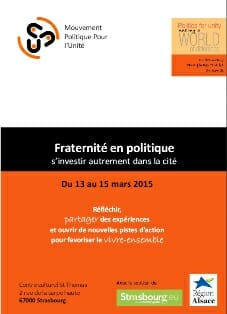 The first event will be held in Rome, Italy, on March 12th at the Aula del Palazzo dei Gruppi Parlimentari in the Italian Parliament. In the morning 300 Focolare youths from around the world – Christian, members of other religions, and some with no formal religious affiliation – will present experiences concerning the socio-political situation in their own lands, and universal brotherhood as a response to current conflicts, during an open dialogue with president of the Chamber of Deputies, the Honourable Laura Boldrini; Secretary General of the European University Institute, Pasquale Ferrara; and Luigino Bruni, Political Economics professor at the LUMSA of Rome. In the afternoon, another 300 people from the fields of politics and public adminstration will take part in a meeting of reflections, testimonies and dialogue in the light of Chiara Lubich’s thought.
The first event will be held in Rome, Italy, on March 12th at the Aula del Palazzo dei Gruppi Parlimentari in the Italian Parliament. In the morning 300 Focolare youths from around the world – Christian, members of other religions, and some with no formal religious affiliation – will present experiences concerning the socio-political situation in their own lands, and universal brotherhood as a response to current conflicts, during an open dialogue with president of the Chamber of Deputies, the Honourable Laura Boldrini; Secretary General of the European University Institute, Pasquale Ferrara; and Luigino Bruni, Political Economics professor at the LUMSA of Rome. In the afternoon, another 300 people from the fields of politics and public adminstration will take part in a meeting of reflections, testimonies and dialogue in the light of Chiara Lubich’s thought.
Strasbourg, March 13-15: A three-day seminar examining fraternity as a political category, especially in relation to cities. Presenters will include Jean-Louis Sanchez, General delegate of ODAS (National Observer of Social Action); Jo Spiegel, Mayor of Kingersheim; and Antonio Baggio, politician and professor at Sophia University Institute, Loppiano, Italy.
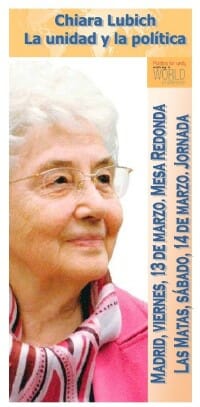 Two events will be held in Spain and Madrid on March 13-14. The first will be held at the Seat of the European Parliament where Chiara Lubich spoke on December 3, 2002 at seminar on The Role of the European Union in global peace and justice. Other thematic topics will be presented the following day at the Mariapolis Centre. One of those topics will be: “Opting for the least.”
Two events will be held in Spain and Madrid on March 13-14. The first will be held at the Seat of the European Parliament where Chiara Lubich spoke on December 3, 2002 at seminar on The Role of the European Union in global peace and justice. Other thematic topics will be presented the following day at the Mariapolis Centre. One of those topics will be: “Opting for the least.”
On March 14th, a meeting will be held at the Seat of Parliament in Seoul, Korea with deputies and people from the field of public administration, to take stock of the march that was begun ten years ago towards a politics of fraternity.
On the same day, in Curitiba, Brazil, deputies, mayors and Brazilian citizens will hold a forum on The thought and political action of Chiara Lubich. Presenters will include the Mayor of the city, Gustavo Fruet; Federal Deputy, Luis Carlos Hauly; Secreatary of Justice and Human Rights for the State of Acre, Nilson Mourão; and the Mayor of Sorocaba, San Paulo, Antônio Carlos Pannunzio.
Meetings will also be held in Canada, Colombia, Honduras, Ireland, Germany, Portugal, Czech Republic, Spain, Tanzania, Hungary, USA, and more.
All the events will be a dialogue focusing on the essential value of unity, which is not ratification, but the result of confrontation. Chiara once stated: “I have a dream. Imagine what the world would be like if not only individuals, but entire peoples, ethnic groups, and states began to practice the Golden Rule: loving the other country as their own.” Her words are proven in the personal lives and political action of people across the world who have embraced her dream.
Focolare president, Maria Voce commented: “The upcoming anniversary will be an opportunity to highlight many positive experiences across the world, in which politicians, administrators, and ordinary citizens are working together for the common good.”
She expressed her hope that “it will be the young people – who often look upon politics with fear or disinterest –that will rediscover politics as a high calling that expands its heart to embrace all people, the most disadvantaged, the most alone, the most in difficulty or marginalized, not only from one’s own country, but from the whole world.” “May your participation in this event,” she concludes, “mark the beginning of a new and more conscious commitment to becoming actively involved in building with many other people of good will, a world that is better, a world that is new.”
Some events can be followed live at: www.politicsforunity.com . There is an online map of events and a summary of texts by Chiara Lubich, chosen by the research committee. The hashtag of the event is: #politics4unity
The 7th anniversary of Chiara’s death (March 14, 2008) will be remembered with a variety of events across the globe. From the biannual Art Event Chiara Lubich at Maracaibo, Venezuela, to the charism of unity through some masterpieces of European art in Cremona, Italy; to the 3rd edition of the Chiara Lubich Memorial Lecture, in Durban, South African Republic. There will be hundreds of Eucharistic Celebrations of Thanksgiving and suffrage for Chiara Lubich, whose Cause of Beatification was officially opened last January 27th.

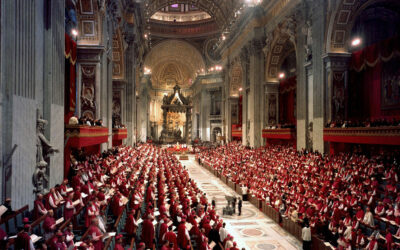
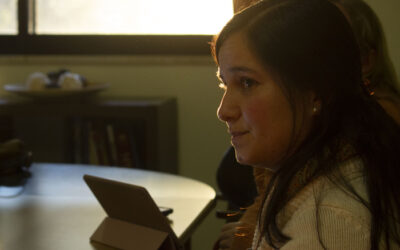
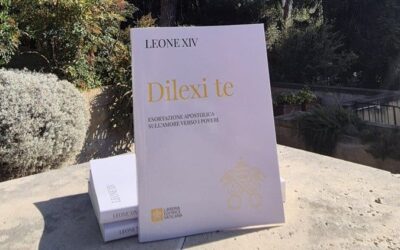
0 Comments